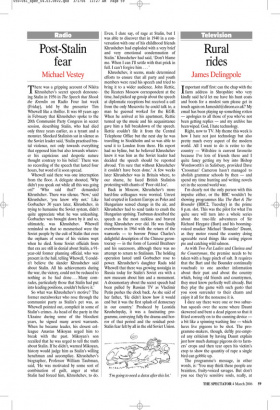Post-Stalin fear
Michael Vestey
There was a gripping account of Nikita Khrushchev’s secret speech denouncing Stalin in 1956 in The Speech that Shook the Kremlin on Radio Four last week (Friday), told by the presenter Tim Whewell like a thriller. It was 60 years ago in February that Khrushchev spoke to the 20th Communist Party Congress in secret session, describing Stalin, who had died only three years earlier, as a tyrant and a monster. Shocked Stalinists sat in silence as the Soviet leader said, ‘Stalin practised brutal violence, not only towards everything that opposed him but also towards whatever his capricious and despotic nature thought contrary to his belief.’ There was no recording of the speech that lasted four hours, but word of it soon spread.
Whewell said there was one interruption from the floor. A delegate shouted, ‘Why didn’t you speak out while all this was going on?’ ‘Who said that?’ demanded Khrushchev. There was silence. ‘Now,’ said Khrushchev, ‘you know why not.’ Like Gorbachev 30 years later, Khrushchev, in trying to humanise the Soviet system, didn’t quite appreciate what he was unleashing. Gorbachev was brought down by it and so, ultimately, was Khrushchev. Whewell reminded us that so mesmerised were the Soviet people by the cult of Stalin that even the orphans of some of his victims wept when he died. Some Soviet officials from that era are still in denial about Stalin, a 91year-old former planning official, who was present in the hall, telling Whewell, ‘I couldn’t believe the slander Khrushchev said about Stalin. All his achievements during the war, the victory, could not be reduced to nothing as he had done ... Many comrades, particularly those that Stalin had put into leading positions, couldn’t believe it.’ So what was Khrushchev’s motive? The former metalworker who rose through the communist party as Stalin’s pet was, as Whewell pointed out, complicit in some of Stalin’s crimes. As head of the party in the Ukraine during some of the bloodiest years, he signed many arrest warrants. When he became leader, his closest colleague Anastas Mikoyan urged him to break with the past. Mikoyan’s son recalled that he was urged to tell the truth about Stalin. If he didn’t, warned Mikoyan, history would judge him as Stalin’s willing henchman and accomplice. Khrushchev’s biographer, Professor William Taubman, said, ‘He was motivated by some sort of combination of guilt, anger at what Stalin had forced him, Khrushchev, to do. Even, I dare say, of rage at Stalin, but I was able to discover that in 1940 in a conversation with one of his childhood friends Khrushchev had exploded with a very brief and very emotional condemnation of Stalin.’ Khrushchev had said, ‘Don’t blame me. When I can I’ll settle with that prick in full. I can’t forgive him ... ’ Khrushchev, it seems, made determined efforts to ensure that all party and youth members were read his speech and tried to bring it to a wider audience. John Rettie, the Reuters Moscow correspondent at the time, had picked up gossip about the speech at diplomatic receptions but received a call from the only Muscovite he could talk to, a man he guessed worked for the KGB. When he arrived at his apartment, Rettie turned up the music and his acquaintance gave him a full breakdown of the speech. Rettie couldn’t file it from the Central Telephone Office but the next day he was travelling to Stockholm and so was able to send it to London from there. His report had no byline, but he believed Khrushchev knew it was him as the Soviet leader had decided the speech should be reported abroad. ‘I’m sure that without Khrushchev it couldn’t have been done.’ A few weeks later Khrushchev was in Britain where, to our shame, he faced British Stalinists protesting with chants of ‘Poor old Joe’.
Back in Moscow, Khrushchev’s more hard-line colleagues were worried. Unrest had erupted in Eastern Europe as Poles and Hungarians sensed change in the air, and Khrushchev had to send tanks to crush the Hungarian uprising. Taubman described the speech as the most reckless and bravest thing Khrushchev ever did. He was finally overthrown in 1964 with the return of the waxworks — to borrow Prince Charles’s delightful description of the Chinese gerontocracy — in the form of Leonid Brezhnev and his successors, although there was no attempt to return to Stalinism. The holding operation lasted until Gorbachev rose to power. Khrushchev’s daughter Rada told Whewell that there was growing nostalgia in Russia today for Stalin’s Soviet era with a new museum about him and a monument. A documentary about the secret speech had been pulled by Russian TV as Vladimir Putin pushes the clock back. As she said of her father, ‘He didn’t know how it would end but it was the first splash of democracy in our country.’ Produced by Leonida Krushelnycky, it was a fascinating programme, conveying fully the drama and horror of that period and the residual postStalin fear felt by all in the old Soviet Union.










































































 Previous page
Previous page